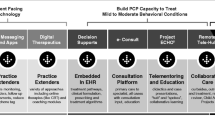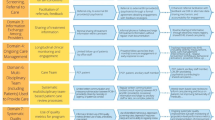Abstract
The supply / demand issue in behavioral health care is a well-established fact, and the mental health toll of the COVID-19 pandemic continues to add challenges to an already taxed system. Existing healthcare models are not set up to adequately address the increasing mental health related needs. As such, innovative models are needed to provide patients with access to appropriate, evidence-based behavioral health care within routine clinical care. This paper introduces Precision Behavioral Health (PBH) as an example of such a model. PBH is an innovative, digital first care delivery model that provides an ecosystem of evidence-based digital mental health interventions to patients as a frontline behavioral health treatment within routine care in a large multispecialty group medical center in the United States. This paper describes the implementation of PBH within a practice research network set-up as part of an integrated behavioral health department. We will present how our team leveraged the RE-AIM (Reach, Effectiveness, Adoption, Implementation, Maintenance; “What is RE-AIM?,“ n.d.) implementation science framework, which emphasizes the design, dissemination, and implementation processes at the individual, staff, and organizational levels, to prioritize key implementation constructs to enhance the successful integration of PBH within routine care. We describe how each of these constructs were operationalized to aid data gathering for rapid evaluation and lessons learned. We discuss the benefits of these types of initiatives across multiple stakeholders including patients, providers, organizations, payers, and digital intervention vendors.

Similar content being viewed by others
References
Abrams, Z. (2020, October 1). Economic uncertainty: How COVID-19 has hit psychologists. Monitor on Psychology, 51(7). https://www.apa.org/monitor/2020/10/economic-uncertainty.
Baumel, A., Muench, F., Edan, S., & Kane, J. M. (2019). Objective user engagement with mental health apps: Systematic search and panel-based usage analysis. Journal of Medical Internet Research, 21(9), e14567. https://doi.org/10.2196/14567.
Bucci, S., Schwannauer, M., & Berry, N. (2018). The digital revolution and its impact on mental health care. Psychology and Psychotherapy: Theory Research and Practice, 92(2), 277–297.
Castonguay, L. G., Barkham, M., Youn, S., & Page, A. C. (2021). Practice-based evidence—Findings from routine clinical settings. In M. Barkham, W. Lutz, & L. G. Castonguay (Eds.), Bergin and Garfield’s Handbook of Psychotherapy and Behavior Change (50th Anniversary Edition; pp. 191–222). John Wily & Sons.
Cohen, J. S., Edmunds, J. M., Brodman, D. M., Benjamin, C. L., & Kendall, P. C. (2013). Using self-monitoring: Implementation of collaborative empiricism in cognitive-behavioral therapy. Cognitive and Behavioral Practice, 20(4), 419–428.
Espie, C. A., Firth, J., & Torous, J. (2022). Evidence-informed is not enough: Digital therapeutics also need to be evidence-based. World Psychiatry, 21(2), 320–321. https://doi.org/10.1002/wps.20993.
Fairburn, C. G., & Patel, V. (2017). The impact of digital technology on psychological treatments and their dissemination. Behaviour research and therapy, 88, 19–25.
Glasgow, R. E., Vogt, T. M., & Boles, S. M. (1999). Evaluating the public health impact of health promotion interventions: The RE-AIM framework. American Journal of Public Health, 89(9), https://doi.org/10.2105/ajph.89.9.1322.
Health Resources and Services Administration (2023). Health workforce shortage areas. https://data.hrsa.gov/topics/health-workforce/shortage-areas.
Hill, C. J., & Joonas, K. (2005). The impact of unacceptable wait time on health care patients’ attitudes and actions. Health Marketing Quarterly, 23(2), 69–87. https://doi.org/10.1300/J026v23n02_05.
IQVIA Institute for Human Data Sciences (2021). Institute report: Digital health trends 2021. https://www.iqvia.com/insights/the-iqvia-institute/reports/digital-health-trends-2021.
Marques, L., Bartuska, A. D., Cohen, J. N., & Youn, S. (2020). Three steps to flatten the mental health need curve amid the COVID-19 pandemic. Depression and Anxiety, 1–2. https://doi.org/10.1002/da.23031.
Martinez-Martin, N., & Kreitmair, K. (2018). Ethical issues for direct-to-consumer digital psychotherapy apps: Addressing accountability, data protection, and consent. JMIR mental health, 5(2), e9423.
McAleavey, A. A., Nordberg, S. S., & Moltu, C. (2021). Initial quantitative development of the norse feedback system: A novel clinical feedback system for routine mental healthcare. Quality of Life Research, 30(11), 3097–3115. https://doi.org/10.1007/s11136-021-02825-1.
Moore, B. A., Fazzino, T., Garnet, B., Cutter, C. J., & Barry, D. T. (2011). Computer-based interventions for drug use disorders: A systematic review. Journal of substance abuse treatment, 40(3), 215–223.
Nordberg, S. S., Eyllon, M., Sah, P., Jaso, B., Youn, S., & Barnes, J. B. (2023). June 21–24). Harnessing the power of data to enact real-time clinical and operational decision making: Two examples from the field. [Conference presentation]. Society for Psychotherapy Research International Annual Meeting, Dublin, Ireland.
Pew Research Center (2019). Smartphone ownership is growing rapidly around the world, but not always equally. https://www.pewresearch.org/global/2019/02/05/smartphone-ownership-is-growing-rapidly-around-the-world-but-not-always-equally/.
Satiani, A., Niedermier, J., Satiani, B., & Svendsen, D. P. (2018). Projected workforce of psychiatrists in the United States: A population analysis. Psychiatric Services, 69, 710–813. https://doi.org/10.1176/appi.ps.201700344.
Substance Abuse and Mental Health Services Administration (2023). Digital Therapeutics for Management and Treatment in Behavioral Health. National Mental Health and Substance Use Policy Laboratory. (PEP23-06-00-0001). https://store.samsha.gov/sites/default/files/pep23-06-00-0001.jpg.
Webb, T., Joseph, J., Yardley, L., & Michie, S. (2010). Using the internet to promote health behavior change: A systematic review and meta-analysis of the impact of theoretical basis, use of behavior change techniques, and mode of delivery on efficacy. Journal of Medical Internet Research, 12(1), e1376. https://doi.org/10.2196/jmir.1376.
What is RE-AIM? (n.d.). RE-AIM. https://re-aim.org/learn/what-is-re-aim/.
Youn, S., Boswell, J. F., Douglas, S., Harris, B. A., Aajmain, S., Arnold, K. T., Creed, T. A., Gutner, C. A., Orengo-Aguayo, R., Oswald, J. M., & Wiltsey Stirman, S. (this issue). Implementation science and practice-oriented research: Convergence and complementarity. Administration and Policy in Mental Health and Mental Health Services Research
Zhang, X., Han, X., Dang, Y., Meng, F., Guo, X., & Lin, J. (2017). User acceptance of mobile health services from users’ perspectives: The role of self-efficacy and response-efficacy in technology acceptance. Informatics for Health and Social Care, 42(2), 194–206. https://doi.org/10.1080/17538157.2016.1200053.
Acknowledgements
We wish to thank the Behavioral Health Integrated Clinicians at Reliant Medical Group for their enthusiastic approach to clinical innovation. Their flexibility and dedication reflect their ongoing commitment to excellence in patient care.
Author information
Authors and Affiliations
Contributions
Soo Jeong Youn and Brittany Jaso were responsible for the initial conceptualization and broad outline of the article. All authors contributed subsections, feedback, and assisted with References. Soo Jeong Youn, Brittany Jaso, and Mara Eyllon organized the drafted sections, managed the revision process, and completed the final paper in accordance with the journal’s formatting guidelines. All authors reviewed the final paper and approved the manuscript.
Corresponding author
Ethics declarations
Declarations
This is a conceptual paper that is submitted as part of a special issue, and does not follow an existing reporting guideline framework. The paper is part of the special issue on: “Practice-Oriented Research”.
Optum Office of Human Subjects Research deemed that the Precision Behavioral Health project did not meet the definition of human subjects research and it was deemed permissible to conduct its operations without direct oversight.
Conflict of Interest
Samuel S. Nordberg has a financial relationship with Mental Health Informatics, which owns the Norse Feedback measure, a measurement-based care tool that has been integrated within routine care at Reliant Medical Group as part of the Precision Behavioral Health initiative described in this paper. Samuel S. Nordberg declares a potential conflict of interest. Dr. Nordberg has a plan in place with OptumCare and Reliant Medical Group to monitor that the potential conflict of interest does not impact methods, results, and publications related to the Norse Feedback measure or Precision Behavioral Health. No other authors have a conflict of interest to disclose.
Additional information
Publisher’s Note
Springer Nature remains neutral with regard to jurisdictional claims in published maps and institutional affiliations.
Rights and permissions
Springer Nature or its licensor (e.g. a society or other partner) holds exclusive rights to this article under a publishing agreement with the author(s) or other rightsholder(s); author self-archiving of the accepted manuscript version of this article is solely governed by the terms of such publishing agreement and applicable law.
About this article
Cite this article
Youn, S., Jaso, B., Eyllon, M. et al. Leveraging Implementation Science to Integrate Digital Mental Health Interventions as part of Routine Care in a Practice Research Network. Adm Policy Ment Health 51, 348–357 (2024). https://doi.org/10.1007/s10488-023-01292-9
Accepted:
Published:
Issue Date:
DOI: https://doi.org/10.1007/s10488-023-01292-9




